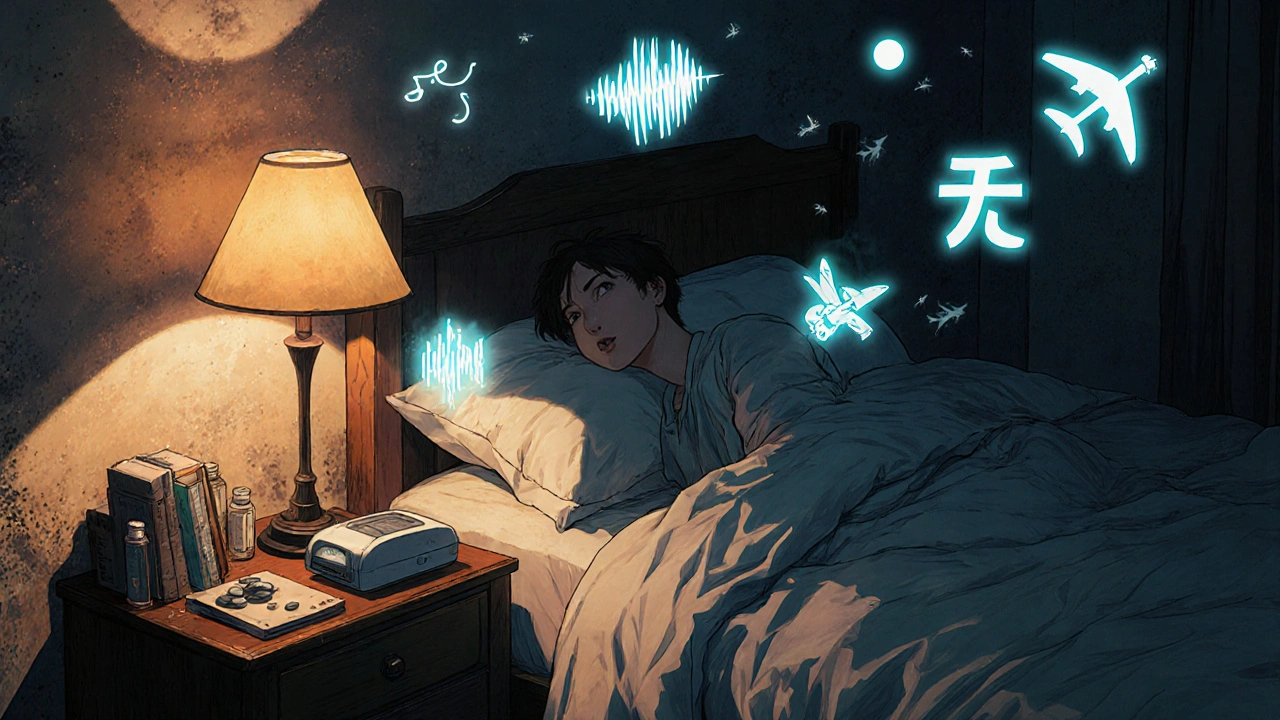What Is Tinnitus, Really?
Tinnitus isn’t a disease. It’s a symptom - a sound you hear when no one else can. For many, it’s a constant high-pitched ring. Others hear buzzing, hissing, roaring, or even clicking. It can come and go, or stick around for months or years. Around tinnitus affects 1 in 5 people globally, and in the U.S. alone, 50 million people experience it to some degree. Of those, 2 million are so badly affected they can’t work or sleep normally.
The sound isn’t coming from outside. It’s your brain misfiring. When the inner ear’s delicate hair cells get damaged - often from loud noise or aging - they start sending random electrical signals to the brain. The brain interprets these as sound. That’s why tinnitus is linked to hearing loss in about 80% of cases. Even if your hearing seems fine, the damage might be subtle, happening in frequencies you don’t notice until the ringing starts.
Is It Just a Ring? The Different Types
There are two kinds of tinnitus, and knowing which one you have matters. Subjective tinnitus makes up 99% of cases. Only you can hear it. This is what most people mean when they say they have tinnitus. It’s tied to hearing loss, earwax buildup, or medications.
The other 1% is objective tinnitus. This is rare, but it’s real. A doctor can actually hear it with a stethoscope placed near your ear. It often sounds like a pulse - your heartbeat syncing with the noise. That’s called pulsatile tinnitus. It’s usually caused by blood flow issues near the ear: clogged arteries, a small tumor, or even high pressure inside your skull. If your tinnitus pulses, you need imaging - an MRI or CT scan - to rule out something serious.
Most people feel it in one ear (60%), but it can be in both. The pitch and volume vary wildly. Some describe it like crickets. Others say it’s a jet engine. It’s not just annoying - it’s exhausting. Studies show 68% of people with tinnitus have trouble sleeping. Over half struggle to concentrate. Nearly 4 in 10 avoid social situations because they’re overwhelmed by the noise.
What’s Actually Causing It?
It’s not one thing. Tinnitus is the result of many possible triggers. Here’s what’s most common:
- Hearing loss - Especially age-related (presbycusis). By age 75, half of people have it, and 85% of those also have tinnitus.
- Noise exposure - Concerts, power tools, headphones turned up too loud. Anything over 85 decibels for long periods can damage your ears. This is preventable.
- Earwax blockage - A simple fix. If wax is pressed against your eardrum, it can trigger ringing. Removing it clears up symptoms in 85% of cases within two days.
- Medications - Over 200 drugs can cause tinnitus as a side effect. Aspirin (at high doses), certain antibiotics, diuretics, and some antidepressants are common culprits. Stopping the drug often helps - but not always.
- Ear infections or sinus pressure - Fluid buildup or inflammation can change pressure in the ear and cause ringing.
- Stress and anxiety - Not a direct cause, but they make it worse. Your brain gets stuck in a loop: you hear the noise → you get anxious → your brain pays more attention → the noise feels louder.

How Is It Diagnosed?
You don’t need a fancy test to know you have tinnitus - you hear it. But finding the cause takes work. Your doctor will start with a basic ear exam. If you’ve got wax or an infection, that’s easy to fix.
If it’s not obvious, you’ll be sent to an ENT specialist. They’ll do a full hearing test (pure-tone audiometry). If you have hearing loss - especially in high frequencies - that’s your biggest clue. For pulsatile tinnitus, they’ll order an MRI with contrast. It’s the most accurate way to spot blood vessel problems.
They might also use the Tinnitus Handicap Inventory (THI). It’s a 25-question survey that scores how much tinnitus affects your life. Scores range from 0 to 100. A score above 58 means it’s severely impacting you - sleep, work, mood, relationships. That’s when you need more than just advice.
What Actually Works for Management?
There’s no magic cure. But there are proven ways to make it bearable - even disappear over time.
- Hearing aids - If you have hearing loss, this is your best first step. Modern hearing aids don’t just amplify sound - they include built-in sound therapy. Studies show 60% of users report less ringing after using them. The brain gets distracted by real sounds instead of focusing on the phantom noise.
- Sound therapy - White noise machines, fans, or apps playing ocean waves or rain can mask the ringing. It doesn’t stop the tinnitus, but it makes it less noticeable. About half of people find relief this way. Try apps like myNoise or SoundCure - they’re designed by audiologists.
- Cognitive Behavioral Therapy (CBT) - This isn’t just talking. CBT rewires how your brain reacts to tinnitus. In 8-12 weekly sessions, you learn to stop fighting the sound. Instead, you learn to ignore it. Studies show 50-60% of people feel significantly less distress after CBT. It’s covered by many insurance plans.
- Masking devices - These look like hearing aids but emit low-level noise to drown out the ringing. They’re less popular now because hearing aids do the same thing - and help your hearing too.
- Addressing underlying causes - If earwax is the problem, cleaning it out helps. If a medication is causing it, switching drugs might fix it. If high blood pressure is contributing, managing it can reduce the pulse-like ringing.
What’s New? Emerging Treatments
Science is making progress. Two devices recently got FDA approval and are changing lives.
The Lenire device uses bimodal stimulation - sound through headphones and gentle electrical pulses on your tongue. It trains your brain to stop focusing on the tinnitus. In a 2020 trial, 80% of users had major improvement that lasted over a year. It’s not cheap - around $3,000 - but it’s covered by some insurers in the U.S. and Australia.
The Oasis device uses personalized sound therapy based on your hearing profile. It’s designed to target the exact frequency of your tinnitus. Clinical tests showed 65% of users had lasting relief.
Other options being tested include transcranial magnetic stimulation (TMS), which uses magnetic pulses to calm overactive brain areas, and new drugs targeting brain inflammation linked to chronic tinnitus. None are widely available yet, but research is accelerating.

What Doesn’t Work - And What to Avoid
There’s a lot of noise out there - literally. Don’t waste money on:
- Herbal supplements - Ginkgo biloba, zinc, melatonin - no strong evidence they help tinnitus.
- Ear candling - Dangerous. Doesn’t remove wax. Can burn your ear.
- Unproven “cures” - Devices sold online promising instant relief? They’re scams. Tinnitus doesn’t work that way.
- Isolating yourself - Avoiding noise makes your brain more sensitive to tinnitus. Stay engaged. Listen to music. Go for walks. Don’t hide.
Living With It - Daily Tips
Most people get better over time. About 80% of new cases improve within 6-12 months as the brain adapts. But you need to help it along.
- Protect your ears - Use earplugs at concerts, when mowing the lawn, or using power tools. Don’t wait until it’s too late.
- Manage stress - Meditation, yoga, deep breathing. Stress makes tinnitus louder. Calm your mind, and the ringing fades into the background.
- Sleep well - Use a sound machine at night. Don’t sleep in silence - that’s when tinnitus feels loudest.
- Check your meds - Review your prescriptions with your doctor. Ask if anything could be making it worse.
- Join a community - Reddit’s r/tinnitus has 65,000 members. Talking to others who get it helps more than you think.
When to See a Doctor
You don’t need to panic. But see a specialist if:
- The ringing is only in one ear
- It’s pulsing with your heartbeat
- It started suddenly after a head injury
- You have dizziness, numbness, or vision changes along with it
- It’s getting worse or interfering with daily life
Early intervention makes a huge difference. If it’s caused by earwax or a medication, fixing it early means you might never have to live with it.
Can tinnitus go away on its own?
Yes, for many people. About 80% of new tinnitus cases improve within 6 to 12 months without treatment. This is because the brain learns to filter out the noise - a process called neural adaptation. But if it lasts longer than a year, it’s more likely to become chronic. That’s why managing it early matters - even if you think it might fade.
Is tinnitus a sign of hearing loss?
In about 80% of cases, yes. Tinnitus often shows up before you notice you’re having trouble hearing. The damage to your inner ear hair cells that causes tinnitus also reduces your ability to pick up high-frequency sounds - like birds chirping or children’s voices. A hearing test can confirm if this is happening.
Can headphones cause tinnitus?
Absolutely. Listening to music or podcasts at high volumes - especially over earbuds - can damage your hearing over time. The risk goes up if you use them for more than an hour a day at more than 60% volume. Use noise-cancelling headphones to block outside noise so you don’t have to turn the volume up. Take breaks. Your ears need rest.
Does caffeine make tinnitus worse?
The evidence is mixed. Some people report louder ringing after coffee, while others notice no change. Caffeine can increase blood pressure and stress hormones - both of which can make tinnitus feel worse. If you suspect it’s a trigger, try cutting it out for two weeks. See if your symptoms improve.
Are there any medications to cure tinnitus?
No approved drug cures tinnitus. Some doctors prescribe antidepressants or anti-anxiety meds to help with the emotional toll - not the sound itself. Medications like gabapentin or alprazolam are sometimes tried, but studies show limited benefit. The focus is on managing the reaction to tinnitus, not eliminating the sound.
Can tinnitus lead to depression?
It can. Chronic tinnitus is strongly linked to anxiety and depression. The constant noise can make you feel isolated, frustrated, and hopeless. That’s why CBT is so important - it helps break the cycle of distress. If you’re feeling overwhelmed, talk to a mental health professional. You’re not alone, and help is available.

Andrew Forthmuller
November 11, 2025 AT 17:57vanessa k
November 12, 2025 AT 11:07manish kumar
November 13, 2025 AT 18:53Nicole M
November 15, 2025 AT 01:47Arpita Shukla
November 16, 2025 AT 23:04Mark Rutkowski
November 17, 2025 AT 12:14Ryan Everhart
November 18, 2025 AT 18:45David Barry
November 19, 2025 AT 11:18